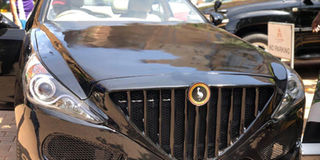East Africa examines policy change in motor assembling

The Kiira EVS. In 2014, Kiira Motors Corporation launched its hybrid electric vehicle Kiira EV Smack. File Photo
What you need to know:
East African countries are discussing the feasibility of a policy, limiting importation of equipment used in assembling motorcycles
Uganda and her neighbours in East Africa are discussing the likelihood of a policy change in assembling motor cycles and vehicles.
Mr Dickson Kateshumbwa, commissioner for customs at Uganda Revenue Authority (URA) revealed that the East African countries are discussing the feasibility of a policy, limiting importation of equipment used in assembling motorcycles.
“As East African community, we did a study to look at the issue of motor vehicle and motorcycle assembling starting with motorcycles. We already have a company making tyres in Uganda,” he said threatening more tariffs on imported tariffs as a protection measure for local manufactured tyres.
CCLE is a company in Uganda dealing in motorcycle tyres, tubes and lubricants.
The study, Kateshumbwa said, is progressing with other components needed to assemble motorcycles with an aim of protecting locally manufactured products from imports.
For instance, he alluded to frames, saying if they can be made in East Africa, on the back of a robust steel industry, the policy will change.
“If you are going to assemble a motorcycle here, and you need 20 parts, but of those, six are available in the region, we shall have to tax the six highly so that you consume the ones in the region,” he said.
The policy shift, pending discussions, will transcend to motor vehicles eventually.
Motor vehicle assembling
The policy comes on the heels of the country’s vested interests in motor vehicle assembling with the Shs63.7b Kiira car assembling plant expected to be completed in two and half years.
A report will be tabled next month to discuss the viability of the proposed policy change.
Policy changes aimed at boosting local content have always been welcomed, with a curtain of inquiries into capacity and quality of the products.
URA, Kateshumbwa revealed clears around 7,500 motorcycles on a monthly basis.
Essentially, this means that local tyre companies in Uganda should have the capacity to manufacture a minimum of 15,000 quality tyres per month.
According to URA, this should be seen as an investment opportunity for the business community to tap into the market.
Current situation
The assembling companies, for instance Chinese bus assembling plant in Namanve launched in March, uses imported products from China.
The Mbale developer, Tiang Tang while commissioning Sany truck centre recently announced that it is going to build another bus assembling plant in Mbale industrial park.
The truck centre, expected to take shape in two years, is hoped to make Uganda the largest operations centre for heavy duty equipment.
Heavy duty machinery remains expensive
Mr Raymond Kyazze, general manager Victoria Equipment Limited, distributors of Komatsu heavy duty machinery such as road construction equipment, said equipment is expensive.
“Equipment is quite expensive and we do not manufacture it here. We import from Japan and you have to pay cash,” he said.
He advised the contractors to embrace rentals and lease which are cheaper.
For instance, a grader, he said costs Shs800m.




